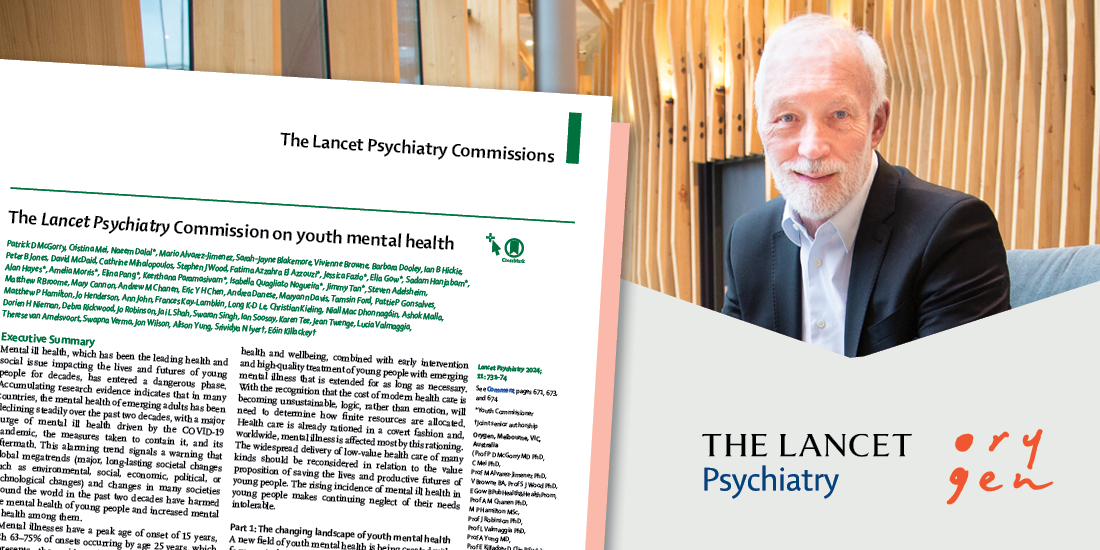
A global consortium of world-leading psychiatrists, psychologists, academics and young people have come together to deliver a definitive analysis of the worldwide state of youth mental health, published today in renowned scientific journal The Lancet Psychiatry.
Led by Orygen, Australia’s Centre of Excellence in Youth Mental Health, with contributions from authors across five continents, the new Lancet Psychiatry Commission on youth mental health marks a pivotal moment in defining the youth mental health crisis and calling for urgent global action.
Lead author and Executive Director of Orygen, Professor Patrick McGorry, said the Commission was the culmination of four years’ work and signified a major step in recognising youth mental health as an international health priority.
“This Commission – and the field of youth mental health – is a global endeavour and necessitates a paradigm shift to tackle a global crisis,” Professor McGorry said.
“This publication is the first definitive guide to youth mental health globally, outlining the current state of play and making the economic, moral and political case for investing in better research, models of care and access to youth mental health care for young people everywhere.
“It is now accepted that mental ill-health is the primary threat to the health, wellbeing and productivity of young people, but while it accounts for 45 per cent of disease globally in those aged 10 to 24 years – only 2 per cent of global health budgets are allocated to addressing it.”
The Commission examined the changing landscape of youth mental health and the global political, socioeconomic and structural megatrends driving psychological distress, including the rise of social media and the threat of climate change, and explored the most effective interventions and models of care for young people in high, middle and low-resource countries.
Joint senior author and Canada Research Chair in Youth, Mental Health and Learning Health Systems, Professor Srividya Iyer from McGill University, said that despite the compelling evidence of need, only a small minority of young people in high-resource settings could access adequate care, while in low- and middle-resource settings access to services was grossly inadequate.
“The neglect of youth mental health is partly attributable to the underinvestment in mental health in general – a problem we see worldwide,” Professor Iyer said.
“This neglect is amplified by the ambivalence society often displays towards young people and their needs, despite the fact young people are crucial for the future of our societies.
“Not only is there a moral imperative to face this crisis in a coordinated, collaborative and effective way, but improving youth mental health is necessary to safeguard the future of societies who are dependent on the capabilities and contributions of their young people.”
Joint senior author and Chief of Research and Knowledge Translation at Orygen, Professor Eóin Killackey, said the commission pointed a way forward, offering evidence-based solutions developed in partnership with young people and those with lived experience of mental ill-health.
“Young people are showing the most serious warning signs and symptoms of a society and a world that is in serious trouble,” Professor Killackey said.
“We need to listen to young people and take the youth mental health crisis seriously – which means more rational allocation of health funding to support the long-term health, wellbeing and productivity of the next generation.
“As long as adolescents and emerging adults are undervalued, languishing in precarity…society itself will become precarious.”
Youth Editor of the Commission, Naeem Dalal, emphasised the global significance of the publication for youth mental health, highlighting its inclusive approach.
“Incorporating the voices of the youth commissioners from diverse cultures worldwide strengthens this work significantly,” Dalal said.
“To truly understand the unique challenges faced by young people today, we must place them at the centre of mental health research, prevention, and treatment.”
“Young people deserve dedicated attention in the global health discourse. Age should not limit our contribution to addressing mental ill-health, and I am proud to be part of a generation leading the way in empowering young people across cultures to find solutions.”
The Commission had 54 authors, including 10 youth commissioners. The paper was led by the Commission editor, Professor Patrick McGorry, and co-edited by Professor Killackey, Professor Iyer, Dr Christina Mei and a youth editor, Dr Naeem Dalal. The Commission consisted of five parts, to which authors were assigned as section Commissioners, youth Commissioners, or co-authors.